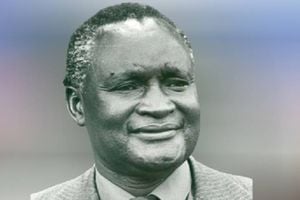Running battles at Uhuru Park as police thwart Gen-Z parallel Mashujaa Day celebrations

Youths shout slogans on Kenyatta Avenue in Nairobi on October 20, 2024, after police officers who had cordoned off Uhuru Park dispersed them.
It was a day of running battles between police and hundreds of youths in Nairobi's Uhuru Park, with the former thwarting plans by the Gen Zs to hold parallel Mashujaa Day celebrations at the venue.
Young Kenyans had mobilised themselves through social media and planned to celebrate the holiday in honour of Kenyans who died during the protests against Finance Bill 2024.
However, their strategy did not materialise as several anti-riot policemen and water cannons were stationed at the park's entry points to prevent anyone suspected of visiting the venue for the parallel event.

People gather at All Saints Cathedral in Nairobi on October 20, 2024, after police officers who had cordoned off Uhuru Park dispersed them to stop a parallel Mashujaa Day event.
The rather chilly weather and a few arrests here and there did not dampen the resolve of hundreds of youth who showed up with their typical "protest gear" - the Kenyan flag, smartphones and water bottles.
Vocal Africa's Executive Director Khalid Hussein and comedian and political activist Eric Omondi were among the dozens arrested for attempting to enter and coordinate the youth's celebrations in Uhuru Park.

People run for safety at Uhuru Park in Nairobi on October 20, 2024, after police officers who cordoned off the park to stop a parallel Mashujaa Day celebrations.
In response, the comedian's wife, Lynne Njihia, took to social media to call for the immediate release of her husband, much to the chagrin of thousands of their followers who also joined the bandwagon calling for Mr Omondi's freedom.
"Release Eric Omondi now. Release my man, please! He was ambushed and taken away by unknown people," she said.
On several occasions, teargas was fired as the youths demanded access to the park, while those who managed to find a way through the contingent of police officers were hurriedly ejected amid shouts of protest.
The precincts of Parliament were also heavily guarded, with police deployed around the August House, which bore the brunt of the anti-finance bill protests on June 25, when the youth managed to enter and destroy parts of the Senate building.
At one point, the youth caused a scare for the officers manning Parliament when they were forced to hurriedly cross Uhuru Highway after police fired tear gas at them as they were about to enter Uhuru Park.
This prompted the security officers to swing into action and block half of the busy highway, forcing the youths to head straight to Haile Selassie Avenue to avoid being caught by one of the two teams of police officers.

Police officers arrest suspects near Uhuru Park in Nairobi on October 20, 2024. The youths wanted to hold parallel Mashujaa Day celebrations.
"We do not understand why Uhuru Park, which is supposed to be Kenya's centre of freedom, is being cordoned off, yet we are here to celebrate our heroes who died for the liberation of our country about four months ago. We are peaceful and demand that we be allowed to exercise our freedom of assembly and association," said John Njuguna.
A recent report by Amnesty International and several other human rights civil societies indicated that some 61 people, six of whom were shot dead, were killed and another 72 were either abducted or remain missing as a result of the protest, which was met with harsh police response.
In a press briefing at Amnesty International's Nairobi offices last month, the organisation detailed its investigation, which included interviews with 23 eyewitnesses and the analysis of 45 videos and over 100 photographs from the protest day.
The report also revealed that 67 cases of enforced disappearances have been logged this year, with 40 cases resolved so far, leaving 27 still unresolved. The International Medico-Legal Unit (IMLU) had at that time, conducted 49 autopsies on victims from the protests.





